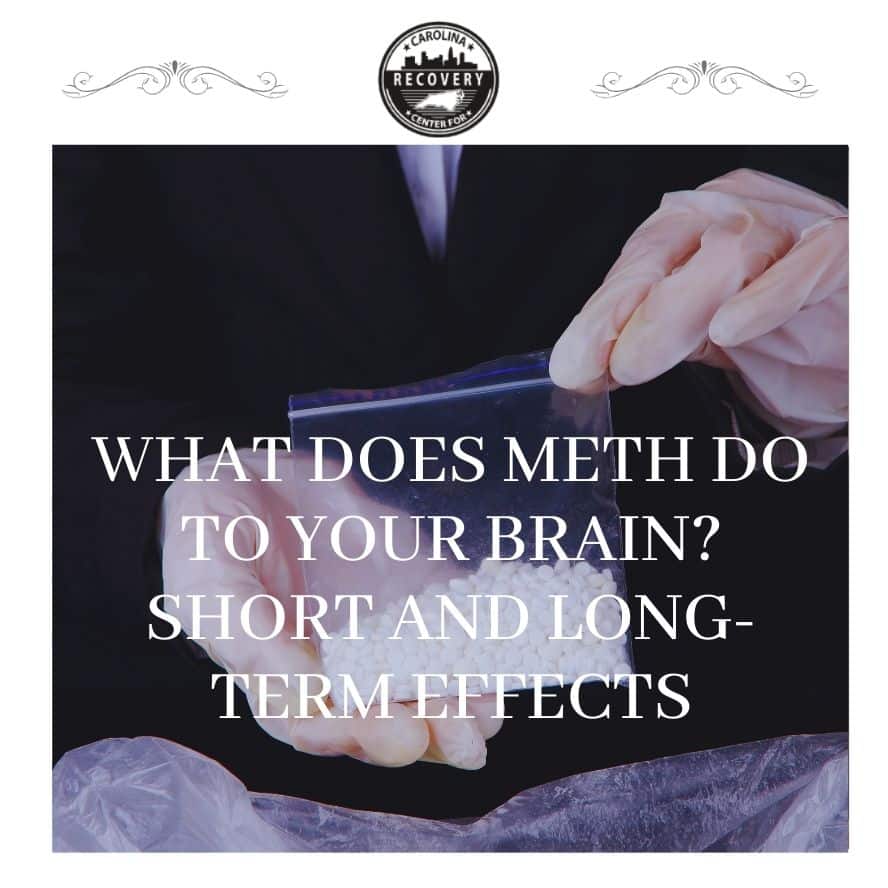What Does Meth Do to Your Brain? Short and Long Term Effects

Medically Verified: 2/1/24
Medical Reviewer
Chief Editor

All of the information on this page has been reviewed and verified by a certified addiction professional.
Methamphetamine is a highly potent stimulant drug that can lead to addiction in just a few uses. According to the National Institute of Drug Abuse (NIDA), 2.5 million people reported using meth in 2021.[1]
While methamphetamine is available by prescription to treat conditions like attention-deficit hyperactivity disorder (ADHD), most people who abuse the drug are buying it off the street. The meth found on the street is not the same as medicinal methamphetamine, as people often use a wide range of dangerous household chemicals to create it. As a result, meth abuse is never safe, and it can have life-altering effects on your brain.
What are the Short-Term Effects of Meth Abuse?
People abuse meth because it causes a rush of euphoria and energy. While meth can make you feel a pleasurable and energetic high, it can also cause paranoia, anxiety, and an inability to sleep. Additionally, people who abuse large doses of meth at once are at risk of experiencing a life-threatening overdose.
The short-term effects of meth include:[2]
- Decreased appetite
- Clenching of the jaw and teeth-grinding
- Dilated pupils
- Increased attention and energy
- Increased activity and wakefulness
- Rapid or irregular heartbeat
- Hyperthermia
- Increased respiration
- Excessive sweating
- Shaking and tremors
- Anxiety, irritability, and paranoia
What are the Long-Term Risks of Meth Abuse?
The longer you abuse meth, the more health risks you are likely to experience. Methamphetamine can wreak havoc on almost every system in your body, causing you to experience a wide range of adverse effects.
The long-term dangers of meth abuse include:[3]
- Addiction
- Anxiety and aggressive behavior
- Brain damage
- Cardiovascular risks
- Cognitive decline
- Severe dental issues
- Increased symptoms of depression
- Liver and kidney damage
- Lung damage
- Memory loss
- Sores from picking the skin
- Changes in mood
- Psychosis
- Weight loss and malnutrition
How Does Meth Affect Your Brain?
Now that you understand all of the long-term risks of meth abuse, it’s time to talk about how it can affect your brain. Long-term use of meth can lead to significant brain damage in a few different ways. Understanding how meth can damage your brain might make you more likely to seek professional addiction treatment.
Meth can affect your brain in the following ways:
Death of Microglia Cells
Microglia cells are responsible for fighting against infectious agents and removing damaged neurons from your brain. These cells keep you safe from infections and keep your cognitive abilities sharp. When someone abuses meth, microglia cells can die at alarming rates.[3]
This means that meth abuse can increase your risk of infections and cause significant cognitive decline.
Decreased White Matter
Your brain contains something called white matter or myelin cells. These cells are responsible for many of the basic functions of your central nervous system. Studies have found that people who abuse meth have decreased levels of white matter in their brains.[4]
A decrease in myelin cells can lead to functional mistakes and a lack of communication in your brain’s systems.
Lessened Dopamine and Serotonin
When you become addicted to meth, your brain begins to rely on it to produce neurochemicals like dopamine and serotonin. These chemicals are responsible for pleasure and reward, which means a lack of them can result in feelings of sadness, emptiness, or depression. Unfortunately, long-term meth abuse causes your brain to be unable to create these chemicals independently.[5]
Increased Glutamate Calcium
Meth increases the amount of glutamate calcium in your brain.[6] Too much of this substance in your brain can lead to neurotoxic effects like preventing your neurons from communicating properly and leading to a decline in cognitive and motor functions.
Find Help for Meth Abuse and Addiction
If you or a loved one regularly abuses meth, it’s time to seek professional help. Long-term meth abuse can lead to significant brain damage in a variety of ways, making sobriety vital to your health.
At Carolina Center for Recovery, we can provide you with the tools and support you need to maintain lifelong sobriety. Our comprehensive, compassionate, and unique treatment helps build a foundation for a healthy recovery and sober future. Clients at Carolina Center for Recovery undergo a personalized journey through one of our highly effective treatment programs. They’re specifically assigned to licensed mental health counselors, certified addiction professionals, or master-level therapists who not only specialize in the issues they’re facing but are paired with them based on their needs.
Contact us today for more information on our meth addiction treatment program.
References:
- The National Institute of Drug Abuse (NIDA): What is the scope of methamphetamine use in the United States, Retrieved October 2023 From https://nida.nih.gov/publications/research-reports/methamphetamine/what-scope-methamphetamine-misuse-in-united-states
- The National Institute of Drug Abuse (NIDA): What are the immediate (short-term) effects of methamphetamine misuse, Retrieved October 2023 From https://nida.nih.gov/publications/research-reports/methamphetamine/what-are-immediate-short-term-effects-methamphetamine-misuse
- The National Institute of Drug Abuse (NIDA): What are the long-term effects of methamphetamine misuse, Retrieved October 2023 From https://nida.nih.gov/publications/research-reports/methamphetamine/what-are-long-term-effects-methamphetamine-misuse
- The National Library of Medicine (NLM): White-matter abnormalities in brain during early abstinence from methamphetamine abuse, Retrieved October 2023 From https://www.ncbi.nlm.nih.gov/pmc/articles/PMC2819660/
- The National Library of Medicine (NLM): Recent Advances in Methamphetamine Neurotoxicity Mechanisms and Its Molecular Pathophysiology, Retrieved October 2023 From https://www.ncbi.nlm.nih.gov/pmc/articles/PMC4377385/
- The National Library of Medicine (NLM): Methamphetamine self-administration modulates glutamate neurophysiology, Retrieved October 2023 From https://www.ncbi.nlm.nih.gov/pmc/articles/PMC5380608/

